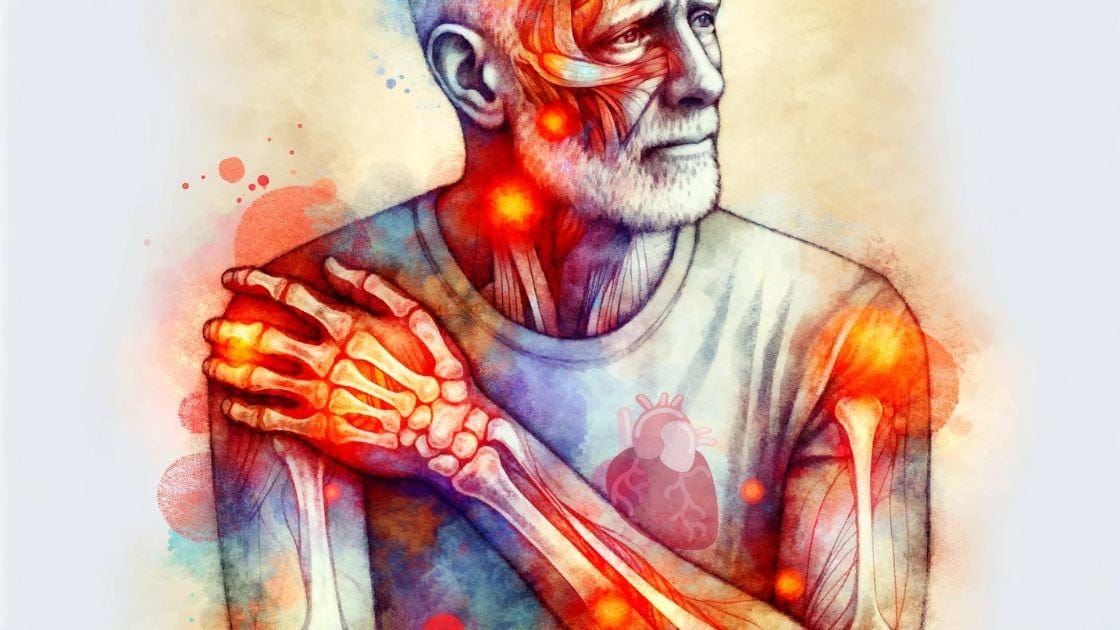Hi there,
Someone recently commented they didn't have problems with inflammation because they don't have chronic pain or arthritis. I think that is a common misconception about inflammation, and I wanted to explain a little bit about how and why chronic inflammation can impact your overall health.
In short, inflammation in one form or another is likely to kill most of us.
First, let me explain that inflammation is the increase in inflammatory cytokines and mediators that occurs as part of the immune system's response to something it thinks is bad - like a virus, bacteria, damaged cell, or toxic compound.
We want a strong inflammatory response when we get a wound -- inflammation can kill off the pathogens and initiate the healing process. The inflammatory response keeps us alive and resilient to all the harmful things in the world.
But low-level, persistent inflammation is also at the root of most chronic diseases. From heart disease to gum disease, PCOS to diabetes, neurodegenerative diseases to major depressive disorder -- elevated inflammatory cytokines play a role.
When it comes to genetics, there is a huge amount of variation in our inflammatory response genes. This keeps us humans resilient as a species -- someone in the village will survive the new pathogen. However, it also means that there are a lot of individual differences in whether someone is more prone to chronic inflammation and which inflammatory cytokines are likely to be involved.
Some people can produce higher levels of TNF-alpha than is normally needed. That's an advantage when fighting off leprosy, but a disadvantage in a modern world full of toxic compounds. For others, it may be one of the interleukins that tends to be elevated - or even the NLRP3 inflammasome that is too easily activated.
Understanding where your genetic susceptibility to inflammation lies can help you make the lifestyle changes (or supplements) to counteract the tendency toward inflammation.
For a long time, I thought that was the whole story -- avoid toxins, tamp down an overactive inflammatory response, and all will be well.
But reducing inflammation is only one side of the coin. As it turns out, researchers now understand that the resolution of inflammation is an active process that depends on specific lipid mediators. Inflammatory cytokines don't just turn off and go away. Instead, there is an active process that shuts down the production of inflammatory cytokines when they're not needed -- and this active process of resolving inflammation simultaneously turns on the healing processes, such as recruiting stem cells to the area of inflammation.
Below are two articles on this: the first is on chronic inflammation and the second is on the resolution of inflammation. Both are important and I hope you can find the time to read them this week.
Gratefully yours,
~ Debbie
Chronic Inflammation: Causes and Natural Solutions
Chronic inflammation causes most chronic diseases.
Let that sink in for a second…
If you have diabetes, arthritis, heart disease, gum disease, kidney disease, lupus, COPD, fatty liver disease, gout, asthma, major depressive disorder, PCOS, neurodegenerative diseases, or pretty much any chronic condition… an underlying cause is low-level, continuing inflammation.
While it may seem counterintuitive, this is actually pretty exciting news. Rather than taking pills to combat symptoms, by targeting the specific pathway causing the inflammation, you may be able to reverse and prevent chronic diseases.
This is a long article. Bookmark it; come back and re-read it; email it to yourself. Whatever it takes. Preventing or reversing the chronic diseases that kill us all… well, this is important.
Specialized Pro-resolving Mediators: Getting Rid of Chronic Inflammation
Recent research has created a paradigm shift in understanding the root cause of many chronic diseases, unresolved inflammation. The mind-blowing research (to me, anyway) is that the resolution of inflammation is an active process that depends on our body’s ability to create specific pro-resolving mediators.
This article applies to everyone with a chronic disease: heart disease, diabetes, gum disease, neurodegeneration, neuropathy, arthritis, chronic pancreatitis, etc.
Healthy and young? This article holds the keys to staying that way.
What I've been reading:
1) Depression as an Inflammatory Disorder
This new study published in Frontiers in Pharmacology investigates the pyroptosis pathway that is involved in programmed cell death. The genetic variants involved in pyroptosis were found to likely influence major depressive disorder.
Related Genetic Lifehacks article: Inflammation and Depression
2) The Role of Taurine in Mitochondria Health: More Than Just an Antioxidant
This is an excellent overview of how taurine is important as an antioxidant in mitochondrial health.
Genetic Lifehacks deep dive on taurine coming next week!






